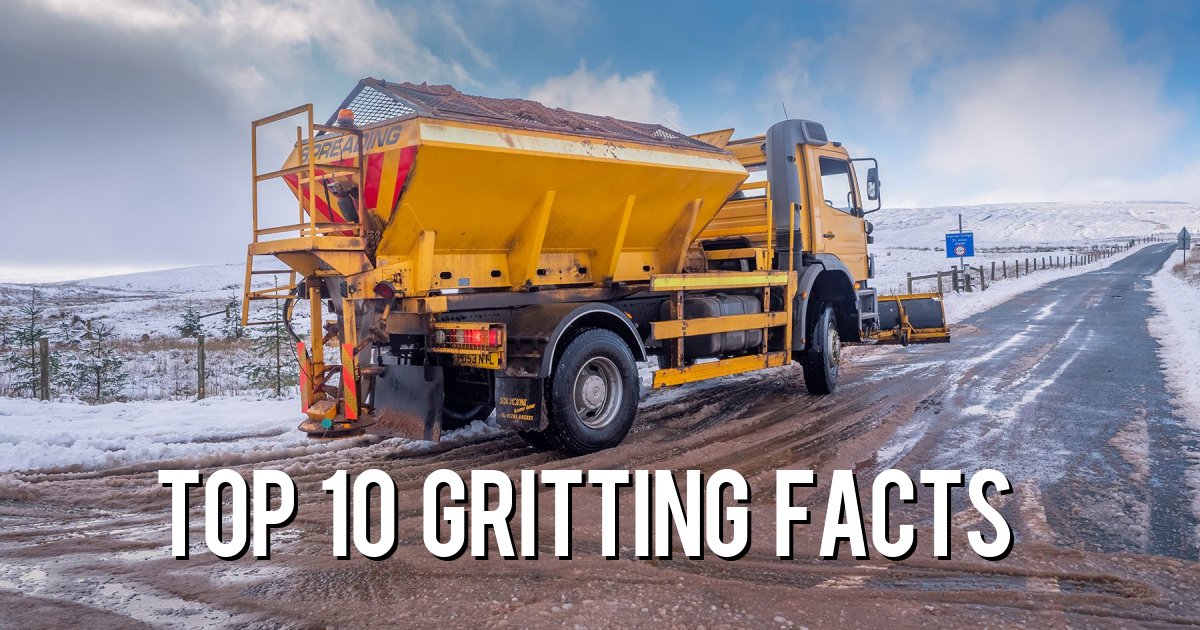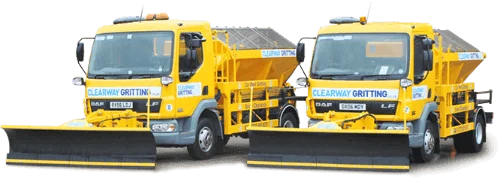Gritting isn’t as simple as it looks. When bad weather arrives, we expect our roads to be gritted so we can carry on as usual.
This article uncovers some of the gritting myths, but also explains how our council and private gritting contractors prepare for bad weather.
1. Gritters use salt on our roads – not grit
What our gritting lorries spread is referred to as ‘grit’ but what is actually spread in car parks, pavements and on roads is either rock salt or marine salt. Both salt products lower the freezing point of moisture on the road surface, so ice or snow that has already formed will melt and will prevent more ice forming.
Salt doesn’t directly melt snow because if first mixes with the snow and a saline solution forms when the melting point lowers. This is why salt is spread in advance of snowfall, so it creates the saline solution and reduces the possibility of snow and ice forming which both reduces the need for snow clearance and makes the operation much more effective.
Gritters normally sign up with one or a couple of salt suppliers to guarantee to get all the salt supplies required during the winter gritting season. A typical gritting contractor may use as much 3-4,000 tonnes of salt each season.
Many contractors are now switching from rock salt which is mined and unsustainable to renewable resources like white marine salt that has the added benefit that it is purer than the rock salt as it does not contain the clay impurities.
2. Gritters need to constantly review future weather patterns
It is important that all gritters are prepared for bad weather. In 2018 the severity of the ‘Beast from the East’ surprised many people. Most council gritters and private contractors will pay for accurate weather forecasts so they can predict our bad weather and they know in advance when their gritting services will be required.
The Met Office is the UK’s official weather service. For the last 150 years the Met Office has been important in predicting and understanding global weather and climate science. The Met Office also carry out extensive research. Their research and development team undertake scientific research and review weather and ocean forecasting reflecting on climate predictions
The Met Office website is a useful tool for finding out when you should prepare for snow by organising winter gritting maintenance. The Met Office regularly issues weather warnings that are useful, but you can also add your postcode and the website provides daily weather and a long-term weather forecast for your area.
3. Gritting teams go out in the summer
Hot summers can be bad for roads as the sun can start to make the tar on the roads softer than usual. The roads can absorb the heat, and this can alter how drivers use the roads. This can cause a process similar to melting to occur.
Spreading salt on the roads in hot weather can stop the asphalt from melting. It cools the ashphalt as moisture is absorbed from the air. The grit lorries also go out and spread crushed rock dust as it limits damage to roads by creating a non-stick surface.
4. Council gritters don’t grit all our roads
The county councils grit main roads but aren’t responsible for gritting everywhere. If you live on a private road or your road is too small and is inaccessible to large gritting vehicles the council won’t be able to grit. Instead, they will provide your road with a grit bin so residents can grit themselves.
Hertfordshire County Council is a good case study. Hertfordshire County Council provide a winter gritting and salt routing map on their website which details which roads they grit in bad weather. They prioritise primary routes – A and B roads, major bus routes and one road in and out of each village. Then if they have the facilities to grit the secondary routes, they will grit other roads. These include steep roads in urban / residential areas or country roads where drainage is poor.
Most council’s will update their twitter feed when they go out in bad weather so you can get up to date information on where the council gritters are going in heavy snow.
5. Why do private businesses have their own winter gritting contractor?
As all roads will not be covered by the council gritting plan many businesses and commercial enterprises sign a contract with a specialised winter gritting contractor so they can keep their sideroads, company car park, pathways clear so their staff and customers can always reach their offices.
6. Some councils allow local community groups to access free salt
According to the Herts County Council website local groups and associations can help their local community with a self-help scheme. You can ask for free salt if you represent a resident association, resident groups, town and parish councils, schools or community groups and charities. However, there is a limited amount of salt to give away and you can only apply for salt once per year.
7. Why do roads have to be gritted twice?
We often see gritting vehicles regularly gritting a stretch of road. Sometimes when there is considerable snowfall the sludge will get rid of the old grit or if there is rain it will remove grit and this risks the road surface freezing again. If temperatures are due to fall below zero, the gritters will go out after rain but before freezing temperatures arrive. Cars can then work the grit into the ice to help it to thaw. Sometimes gritters have to work in conditions where you get ‘freezing rain’. The rain freezes as it hits the ground so gritters need to go out again.
8. Do councils have to grit pavements?
Many pavements are considered as ‘highways’ and therefore most are the responsibility of the council to clear. However, councils decide which pavements to clear and this will depend on how many people use them, whether alternative paths are available. Often it is left to local communities to clear paths as there is no law against people clearing pavements.
9. Gritting teams need regular training
Gritters have to go out in very bad weather in dangerous conditions when the roads are icy, and there is heavy snowfall. Gritting often happens during the night when we are asleep, when there are no other vehicles on the road, visibility is limited, and temperatures are low. Remember if you see a gritting vehicle on the road you will need to keep back as it is spraying grit onto the road.
Anyone who operates a gritting vehicle will have suitable training. All council and private gritting contractors will make sure their gritting teams understand their gritting vehicles, gritting procedures and processes. Health & Safety issues will be discussed with gritters to make sure they are confident about going out in bad weather. All council gritters work from various council depots so it is important that service delivery staff understand the local area it’s physical characteristics and local weather idiosyncrasies.
10. Why gritters need to have good driving skills
All operators will have good driving skills and understand how to use GPS tracking. They will be taught how to manage the gritting vehicle, the screens that require monitoring and how to effectively grit roads and clear snow.
The gritting vehicle may have a snow plough attached to clear the snow on the road before the salt is dispersed from the back of the vehicle onto the road. The operator has to weigh cells for accurate salt measuring, control how much salt is released and make sure it is released in the right part of the road. The operators also have to work out how much salt to spread on the road which depends on how cold the current conditions are and whether more snow is expected.



